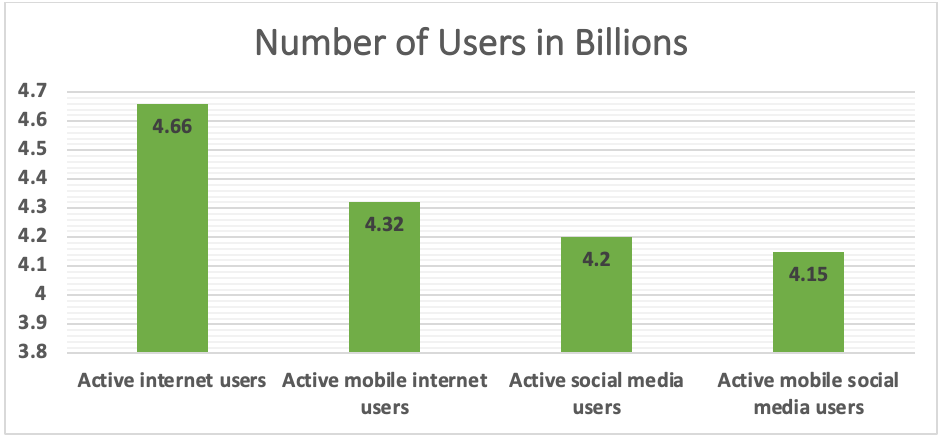A Growing Internet Empire
- Alexandra Catherine Magana
- Aug 20, 2021
- 3 min read
The continuous innovations of mankind brought about different forms of convenience for everyone. For many of us, it is inconceivable to even think of going back to pre-technology days.
Today, we use the Internet for navigation, education, research, social networking, e-commerce, entertainment & so much more. Before we realized, our lives are already filled with Internet related tasks.
Growth Throughout The Years
In a research from Richie et al. (2015) it showcased the growth of Internet users throughout the years.
Figure 1.
Total Number of People Using the Internet

Note. From Ritchie, H., Roser, M., & Ortiz-Ospina, E. (2015, July 14). Internet. Our World in Data. https://ourworldindata.org/internet#citation
Currently, Statista (2021) concluded a report regarding the Global Digital Population as of January 2021. Compared to the earlier graph, there has been a dramatic increase of Internet users across platforms. A total of 4,660,000,000 totaled the number of active Internet users.
Figure 2.
Worldwide Digital Population As Of January 2021

Note. From Johnson, J. (2021, April 7). Worldwide digital population as of January 2021. Statista. https://www.statista.com/statistics/617136/digital-population-worldwide/
How Many Accounts Get Attacked?
And, what can these figures mean?
With all the advantages and life-changing innovations from the Internet, disastrous repercussions are to be expected. Wilde (2018) states that over 2.5 billion accounts were hacked in 2018. Specifically, 6.85 million accounts were hacked each day. For every second, it was counted to be 158.
So, How Can We Protect Our Identity & Personal Information?
These numbers might be daunting and even scare you from even grazing the Internet. However, worry not! Utica College (2018) shared how we can prevent and protect ourselves from hackers by performing the following:
1. Create & Use Strong Passwords
For every account, ensure that it is a mix of alphanumeric letters and symbols. Any information that pertains to you and your loved ones’ birthday, anniversary and nickname is strongly forbidden. Additionally, do not use one password for all your accounts and do not share it to anyone. Ultimately, just remember to change your password every now and then to keep it secured.
2. Look for Encryption in Websites
Every website that you visit must include an s at the end of the letters http. You can locate this in the URL or web address bar. Also, find a lock symbol that is situated on the right side of the address bar. If you see both of these, no one can see your sensitive information as it is only sent to the website’s owner.
3. Install Security Suites to your Devices
Applications such as Norton Antivirus, McAfee Virus Protection and AVG Internet Security block spyware, viruses, and phishing scams. However, a full protection from cybercrime is only possible once subscribed to a premium account. Free accounts only have basic features and a 30-day free trial at most. Although, it is an additional expense. This is a little amount compared to experiencing identity theft.
4. Avoid Phishing Scams
Never open suspicious and unrecognized mails and links. Content that is asking for money to be donated to charities & out of the blue job opportunities is a possible ploy to bait you. These can result to your sensitive information being leaked and identity to be stolen.
5. Protect your Wireless Router using a Password
Your wireless router has to be safeguarded at all times. If not, ill intended people will use your internet to steal information via your device. An encryption feature can also be an added lock as it shuffles the data you send online.
6. Allow Cookies on your Web Browser only when needed
Cookies are asked from visitors of the website to improve the brand’s services. However, this can be taken advantage of. The information on the websites you look up and what your activities there can be tracked. Hence, it is imperative that you only accept cookies for websites that require it.
A Reminder From Yours Truly
Never stop educating yourself and others!
In The End, It Is An Internet Shared Responsibility.
Time and time again, we discover something new and beneficial on the Internet. However, all that is good cannot escape the clutches of evil like-minded individuals. Thus, it is everyone’s responsibility to be vigilant and responsible in one’s Internet tracks.
Information Sources:
Johnson, J. (2021, April 7). Worldwide digital population as of January 2021. Statista. https://www.statista.com/statistics/617136/digital-population-worldwide/
Ritchie, H., Roser, M., & Ortiz-Ospina, E. (2015, July 14). Internet. Our World in Data. https://ourworldindata.org/internet#citation
Utica College. (2019, December 6). Top 10 Ways to Protect Your Identity Online. Utica College Online. https://programs.online.utica.edu/articles/TenWaysToProtectYourIdentity
Wilde, H. (2021, January 5). Over 2.5 Billion User Accounts Have Been Hacked This Year Alone. Here are 4 Things You Can Do to Protect Yourself. Inc.Com. https://www.inc.com/heather-wilde/whether-youve-been-notified-or-not-your-identity-has-been-compromised-heres-what-you-can-do-about-it.html




Comments